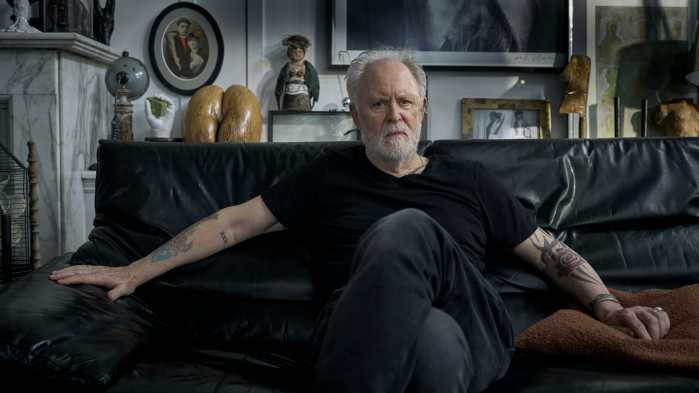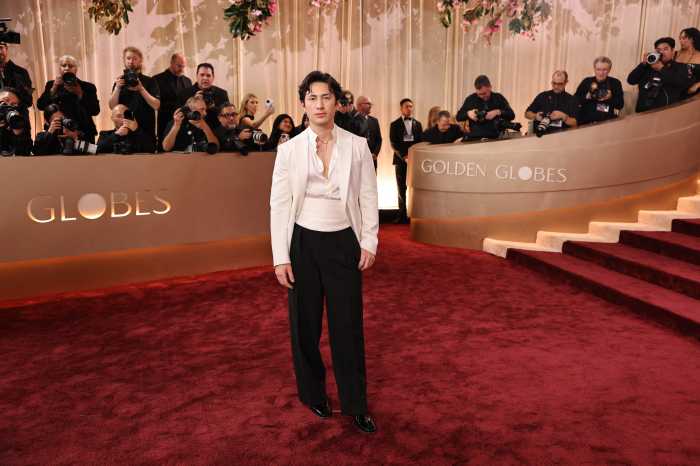Out gay writer/ director Justin Kelly makes fascinating biographical dramas about complicated, intriguing people. His feature debut “I Am Michael” chronicled Michael Glatze, a gay activist who rejected his queer life to become an ex-gay Christian pastor. His sophomore effort, “King Cobra,” recounted the story of underage gay porn star Sean Lockhart, aka Brent Corrigan. Kelly’s latest film, “JT Leroy,” tackles the thorny literary hoax perpetrated by Laura Albert, who wrote “Sarah” and “The Heart Is Deceitful Above All Things” as JT (Jeremiah Terminator) Leroy. She had her sister-in-law, Savannah Knoop, appear in public as the author.
“JT Leroy,” co-written by Kelly and Knoop, is based on the latter’s book, “Girl Boy Girl: How I Became JT Leroy.” It artfully depicts the six years Savannah (Kristen Stewart), a young, bisexual woman, was involved in her sister-in-law Laura’s (Laura Dern) scheme to pose as the author. As they are fêted in Los Angeles or flown to Paris for a press conference, Laura poses as Speedie, JT’s agent. When Eva (Diane Kruger), an actress, takes an interest in making a film of JT’s work — and Savannah starts to have feelings for her — she must navigate the situation carefully.
How things play out is no surprise to anyone who knows the story. However, Kelly’s purpose in making “JT Leroy,” and his strength as a filmmaker, is not about recounting the events, but using the facts to understand the nature of tricky people who are constantly reinventing themselves. Moreover, the film is graced with two pitch-perfect performances by Stewart and Dern.
In a recent phone interview, Kelly spoke with Gay City News about the myth and making of “JT Leroy.”
GARY M. KRAMER: What were your initial impressions of JT Leroy when “he” burst onto the literary scene? Did you read his books? Did you think he was real? And what was your reaction when it was revealed as a hoax?
JUSTIN KELLY: I read “Sarah” shortly after it came out in 2001, and I liked the book, but I wasn’t quite as obsessed with it as a lot of people were. I was more obsessed with the character of JT in Interview and Vanity Fair — the obstructed face and hat. I did think it was real. I moved to San Francisco in 2001 and lived there until after the hoax was unveiled. I had friends who said they saw JT — and I thought they had seen him — but they all saw someone they wanted to see, whether or not he existed. I was as blown away as everyone else by the hoax, but I was fascinated by how and why these two women pulled it off. It was so completely unreal.
KRAMER: There have been two documentaries about the JT Leroy phenomenon, “The Cult of JT Leroy,” which presents an outsider’s perspective, and “Author: The JT LeRoy Story,” which presents Laura Albert’s version of the events. You are telling Savannah Knoop’s version. What made you want to retell this story from Savannah’s perspective?
KELLY: I read Savannah’s book, “Girl Boy Girl: How I Became JT Leroy,” when it came out in 2008. I was familiar with the story, but I didn’t know the details behind how they pulled it off until I read the memoir. It was full of things I didn’t know — political and feminist reasons; it was not for fame and money — and it’s so much more interesting than everyone knows or cares to think about. Laura’s story is interesting as a backstory — how she became JT — but Savannah is more interesting as JT. It is more a coming-of-age story.
KRAMER: This film, like all of your films, deals with the power these people have — or think they have. What observations do you have about the power of celebrity?
KELLY: That’s interesting. The link between all three films for me — which might seem purposeful but wasn’t — is people trying to become or be perceived as someone else. JT is the penultimate version of people being or being perceived as someone they are not — and yes, it deals with celebrity, but it’s tricky. The film doesn’t take sides. In the end, you can make your own judgments. I believe that they didn’t do it for fame. It snowballed and became bigger than they were. The fact that they made JT famous, or the fans made him a bestseller, was because of Laura’s hustling — and that people wanted to be a part of something cool and weird and different.
KRAMER: Laura/ Speedie tried to control — some might say manipulate — JT’s story as much as she could. What are your thoughts about her character and her motivation?
KELLY: [Laughs.] It’s so complicated. I always refer to Laura as an eccentric genius, which is true and fair. Having lived in San Francisco and having had friends feel burned by the hoax, I didn’t try to justify it. It was my extreme fascination in how it could happen in the first place. Like Michael [Glatze] and Brent [Corrigan], I was interested in how they could do extreme things, and diving in to that, not answering the question.
I don’t know Laura; we’ve not met. But I feel from the documentaries and Savannah that a good amount of her story is true. JT was an “avatar,” but he has so much in common with her. She used “him” to explore things and it went too far. The lives and betrayals were not cool, but it wasn’t as much of a hoax as people thought. It’s weird that a lot of people hate on her now, which is fair, but look where she is — she’s not a celebrity. Once JT went away, she went away.
KRAMER: Do you think telling Savannah’s story will change people’s minds about JT Leroy?
KELLY: Good question… I think it will. A lot of people, when they think about this story, they focus on the hype those who felt betrayed put out there. And that’s totally fair. But when I read the memoir, I felt the reasons behind it were not as calculated as people thought. If there’s a takeaway, it’s gaining an understanding of why they did it — even if other people see them as shady, awful people.
JT LEROY | Directed by Justin Kelly | Universal Pictures Content Group | Opens Apr. 26 | Quad Cinema, 34 W. 13th St.; quadcinema.com


































